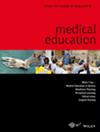Feedback is a crucial element in learning. While studies in the field of healthcare professions education have highlighted the process of educators feeding back to learners, relatively little investigation exists on learners feeding back to educators in Asian cultures. Studies show that recipients of effective feedback develop educational skills and reflective practice, but the process of giving feedback seems to have been mainly studied through surveys and questionnaires. Such research offers little to no insights on feedback providers' and recipients' experiences of feedback. To fill the gap, in the context of multi-source feedback, we investigate medical students, residents, and nurses feedback giving to clinical educators (and their receiving of this) following a case presentation training course. We aim to understand the facilitators and inhibitors that encourage and/or prevent feedback provision alongside educators' uptake and reactions.
We used semi-structured group interviews. Participants comprised five different categories of participants: year-4 medical students (n = 6); residents (n = 5); nurses (n = 4); junior clinical educators (n = 9); senior clinical educators (n = 3). We asked them about their experiences of providing feedback to educators and educators receiving of feedback on their teaching. Group interviews were conducted in the largest healthcare institution in Taiwan. Data were analysed using thematic Framework Analysis and managed in ATLAS.ti 8.0.
We identified two major themes with respective sub-themes: (1) Factors affecting feedback giving (including desire for improvement, feedback content, process of feedback, feedback fears, feedback prevention and medical hierarchy); and (2) Educators' reactions to receiving feedback (including validity of feedback, face-saving and emotional reactions to receiving feedback).
Feedback provision to educators on their teaching, and educators' receiving of this feedback in an Asian culture brings forth issues around medical hierarchy, in-person feedback and face-saving, which have important implications for effective and optimal delivery of feedback. Curricular developers should consider the context of feedback (e.g. anonymously online), facilitating students as active participants for the development of educational quality, and educators' mindful practice when engaging with student feedback.


